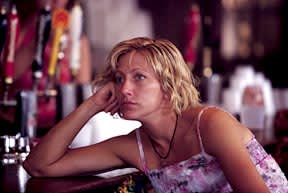Sunshine State feels like the film John Sayles has been building up to for years. It's like several films in one a British mini-series you assume an American will never make, and manages to be both complex and compact. The story takes place on Plantation Island, Florida where local residents are being pushed out by developers and big business. (A chorus of golfers, led by Alan King, takes us through Sayles' version of the history of the state that Florida is "nature on a leash," that business built the tourism we know as Florida, that the same industry brought the working class down and is now pushing them out, that everyone has been duped because it's all a swamp.) Sayles uses a dozen characters with story lines that sometimes intersect only briefly and it's never too much or tiring. Everything is essential and electric.
The two main stories Desiree (Angela Bassett) coming home after many years and Marly (Edie Falco) trying to find a way out run parallel to one another. Both women must deal with aging parents, extended families, old lovers and dreams that didn't pan out. Bassett and Falco play strong, able women confused by the life they're living and choices made. These actresses should steal the show but the competition is tough because everyone in Sunshine State is exceptional. Actors, like Timothy Hutton and Ralph Waite, thought to be beyond their prime (if they even had a prime) prove what can happen with a good script and director. None of the characters feel like cardboard cut-outs or stereotypes. Sayles' dialogue is funny, natural and insightful. He doesn't cut corners and sacrifice character development for a swift plot. These people are the story what happens to them drives the plot.
But Sunshine State is more than a movie about "coming to terms with the past." Sayles is never so simple. It deals with history (and its many versions), tradition, what constitutes loyalty to family, community and yourself, little fish being swallowed by big ones. There is nostalgia for the days of segregation because a) it was an easier time or b) it was when African Americans had a community of their own. Integration means dissolution. As Dr. Lloyd (Bill Cobb) asks, you can shop anywhere you'd like but "who owns the business?" Real estate developers are eating up the small business and building strip malls and gated communities. Everything is changing and no one knows what will happen next.
This story could have been told a dozen ways. Despite being just over two hours long, it feels like it is just beginning. I'm a sucker for chatty films so Sayles rarely disappoints (Everyone always has so much to say!) and Sunshine State rivals Eight Men Out and Matewan. It sticks with you. It provides new perspective to a story we've maybe heard before without providing easy answers.
The two main stories Desiree (Angela Bassett) coming home after many years and Marly (Edie Falco) trying to find a way out run parallel to one another. Both women must deal with aging parents, extended families, old lovers and dreams that didn't pan out. Bassett and Falco play strong, able women confused by the life they're living and choices made. These actresses should steal the show but the competition is tough because everyone in Sunshine State is exceptional. Actors, like Timothy Hutton and Ralph Waite, thought to be beyond their prime (if they even had a prime) prove what can happen with a good script and director. None of the characters feel like cardboard cut-outs or stereotypes. Sayles' dialogue is funny, natural and insightful. He doesn't cut corners and sacrifice character development for a swift plot. These people are the story what happens to them drives the plot.
But Sunshine State is more than a movie about "coming to terms with the past." Sayles is never so simple. It deals with history (and its many versions), tradition, what constitutes loyalty to family, community and yourself, little fish being swallowed by big ones. There is nostalgia for the days of segregation because a) it was an easier time or b) it was when African Americans had a community of their own. Integration means dissolution. As Dr. Lloyd (Bill Cobb) asks, you can shop anywhere you'd like but "who owns the business?" Real estate developers are eating up the small business and building strip malls and gated communities. Everything is changing and no one knows what will happen next.
This story could have been told a dozen ways. Despite being just over two hours long, it feels like it is just beginning. I'm a sucker for chatty films so Sayles rarely disappoints (Everyone always has so much to say!) and Sunshine State rivals Eight Men Out and Matewan. It sticks with you. It provides new perspective to a story we've maybe heard before without providing easy answers.
